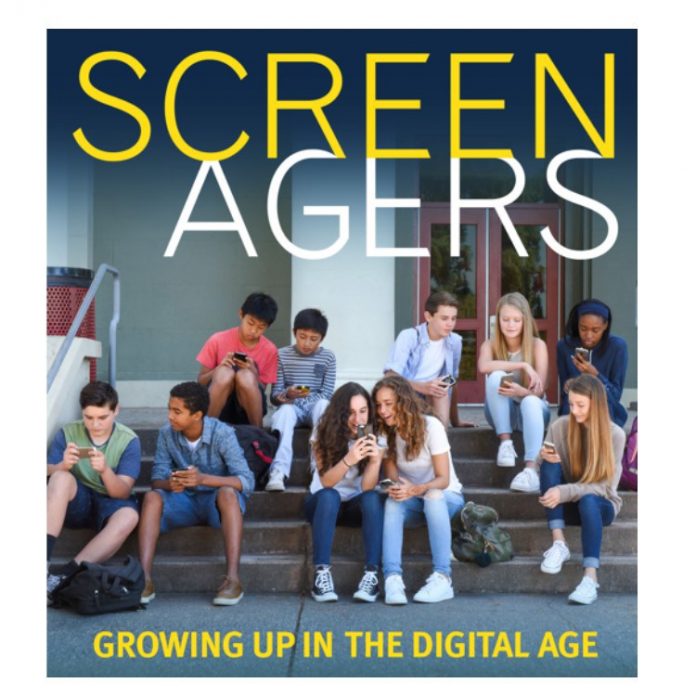Samantha Joslin
Features editor
sjoslin1@jccc.edu
You’ve heard it all before: adults preaching the values of face-to-face interaction, apocalyptic parental terror at the horrors of cellphones, the patronizing claims from adults that they actually played outside.
“Screenagers: Growing Up in the Digital Age” isn’t anything new. The basic premise is that of a worried mother, with a daughter craving a smartphone and a son addicted to video games, braving the world of science and parental horror stories to find the truth about technology.
The documentary, showed on Tuesday in the Hudson Auditorium at the Nerman Museum of Contemporary Art and on Wednesday in the Craig Community Auditorium, drew a crowd with promises of free popcorn and the precedent “award-winning.” In truth, the film has only won a special recognition award at an annual mid-range film festival at Stony Brook University in Stony Brook, New York. I’m not surprised it hasn’t won anything more significant.
The film did show a considerable amount of research; however, most all of it was in line with the beliefs of the filmmaker, aforementioned mother Delaney Ruston. The movie opened with a reel of credits being shown to the embarrassing tune of “Radioactive” by Imagine Dragons, and the cheesiness didn’t stop there.
Older adults with their qualifications shining under their names rambled on about teenagers’ technology “addiction.” One interviewee made the portentous point that these addictions aren’t the fault of the teen, due to their underdeveloped brains, which made all the mothers in the room gasp — technology is tricking my child!
Another source went on about how people, rather than worrying about “how good a person you are” and “how much volunteer work you’ve done,” choose to worry about physical appearance. She spoke like this was a horrific consequence of modern culture, and not something that was evolutionarily natural and has existed since the beginning of humanity.
That being said, a few of the film’s researcher and psychologist sources had more broad-minded opinions, asserting that change should be accepted, and children shouldn’t be hidden from it or blamed for it. For the most part, though, the documentary’s concepts were painfully old-fashioned.
At one point, a high school girl told a story of how a boy asked her for nude photos, and, once she sent them, pretended he’d never asked for them, eventually leading to her friends spreading the photo around the school. It’s hard for me to understand how a person can actually blame technology for this problem, and not the boy, for thinking it was okay to ask a young girl for nude photos, or her friends, for trying their hand at cyber-bullying. Bullying, judgment at first glance, children’s tendency toward distraction: none of these are new problems in society. They’ve only found a new facet of expression through technology.
At many points in the film, I found myself rolling my eyes. The way this documentary folds information only to prove its own point creating an echo chamber that further terrifies parents. This turns the genuine scientific research citing the negative effects of phones into white noise for teens who are tired of hearing the same things over and over again.
Visually, the film expressed itself in typical documentary fashion, with dramatic fade-outs and the voices of panicked, established sources rambling about the end of the world playing over depressing B-roll shots of babies holding cellphones and groups of friends sitting at tables, focused on their screens rather than each other.
What was surprisingly pleasant was the period of discussion and Q&A, led by a professional panel, after the film. Once the cringey documentary ended after a winded 47 minutes, the auditorium lights rose and the viewers, mostly clusters of older women and a handful of students sitting alone, examined what they’d seen.
The panel was different each day of the film. While the film itself may be hackneyed and overdone, the afterward discussion was insightful and progressive.
It’s due to this, and not necessarily the choice of film, that I recommend future campus film screenings to any students looking to fill time between classes — the documentary itself was short enough to fit in an empty class slot, while the discussion afterward made the overall experience about an hour and a half. If you can’t fit it all into your schedule, I recommend catching the discussion segment over the film, at least based on this experience.
As far as “Screenagers” goes, the entire 47 minutes could be spent doing literally anything else and you’d learn more than you would have while it was on. There was nothing new or interesting in the film, and I don’t recommend it. However, if you’re a student looking to find things to do on campus or fill time between classes, attending a future film screening is an eye-opening way to spend your time, if for nothing than the discussion at the end.






















